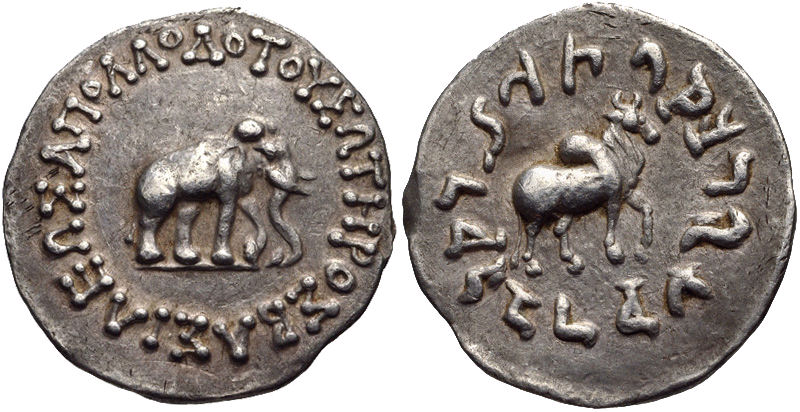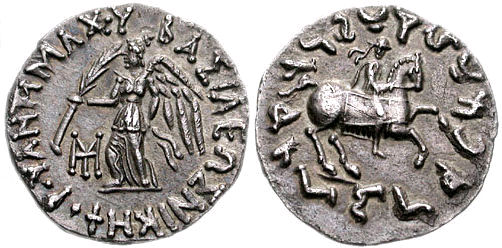|
Apollodotus I
Apollodotus I (Greek: , ''Apollódotos ho Sōtḗr'', "Apollodotus the Saviour"), known in Indian sources as Apaladata, was an Indo-Greek king from 180 BC to 160 BC, or between 174 and 165 BC (first dating by Osmund Bopearachchi and R. C. Senior, second dating by Boperachchi) who ruled the western and southern parts of the Indo-Greek kingdom, from Taxila in the Punjab region to the areas of Sindh and possibly Gujarat. Ruler of the Indo-Greek kingdom Apollodotus whose name means "given by Apollo", was not the first to strike bilingual coins outside Bactria, but he was the first king who ruled in India only, and therefore the founder of the proper Indo-Greek kingdom. According to W. W. Tarn, Apollodotus I was one of the generals of Demetrius I of Bactria, the Greco-Bactrian king who invaded northwestern India after 180 BC. Tarn was uncertain whether he was a member of the royal house. It is possible he was an illegitimate son of Euthydemus, making him Demetrius’ hal ... [...More Info...] [...Related Items...] OR: [Wikipedia] [Google] [Baidu] |
Indo-Greek
The Indo-Greek Kingdom, also known as the Yavana Kingdom, was a Hellenistic period, Hellenistic-era Ancient Greece, Greek kingdom covering various parts of modern-day Afghanistan, Pakistan and northwestern India. The term "Indo-Greek Kingdom" loosely describes a number of various Hellenistic states, ruling from regional capitals like Taxila, Sagala, Pushkalavati, and Bagram. Other centers are only hinted at; e.g. Ptolemy's ''Geographia (Ptolemy), Geographia'' and the nomenclature of later kings suggest that a certain Theophilos (king), Theophilus in the south of the Indo-Greek sphere of influence may also have had a royal seat there at one time. The kingdom was founded when the Graeco-Bactrian king Demetrius I of Bactria invaded India from Bactria in about 200 BC. The Greeks to the east of the Seleucid Empire were eventually divided to the Greco-Bactrian Kingdom, Graeco-Bactrian Kingdom and the Indo-Greek Kingdoms in the North Western Indian Subcontinent. During the two cent ... [...More Info...] [...Related Items...] OR: [Wikipedia] [Google] [Baidu] |
Apollo
Apollo is one of the Twelve Olympians, Olympian deities in Ancient Greek religion, ancient Greek and Ancient Roman religion, Roman religion and Greek mythology, Greek and Roman mythology. Apollo has been recognized as a god of archery, music and dance, truth and prophecy, healing and diseases, the Sun and light, poetry, and more. One of the most important and complex of the Greek gods, he is the son of Zeus and Leto, and the twin brother of Artemis, goddess of the hunt. He is considered to be the most beautiful god and is represented as the ideal of the ''kouros'' (ephebe, or a beardless, athletic youth). Apollo is known in Greek-influenced Etruscan mythology as ''Apulu''. As the patron deity of Delphi (''Apollo Pythios''), Apollo is an oracular god—the prophetic deity of the Pythia, Delphic Oracle and also the deity of ritual purification. His oracles were often consulted for guidance in various matters. He was in general seen as the god who affords help and wards off e ... [...More Info...] [...Related Items...] OR: [Wikipedia] [Google] [Baidu] |
Indian Ocean
The Indian Ocean is the third-largest of the world's five oceanic divisions, covering or approximately 20% of the water area of Earth#Surface, Earth's surface. It is bounded by Asia to the north, Africa to the west and Australia (continent), Australia to the east. To the south it is bounded by the Southern Ocean or Antarctica, depending on the definition in use. The Indian Ocean has large marginal or regional seas, including the Andaman Sea, the Arabian Sea, the Bay of Bengal, and the Laccadive Sea. Geologically, the Indian Ocean is the youngest of the oceans, and it has distinct features such as narrow continental shelf, continental shelves. Its average depth is 3,741 m. It is the warmest ocean, with a significant impact on global climate due to its interaction with the atmosphere. Its waters are affected by the Indian Ocean Walker circulation, resulting in unique oceanic currents and upwelling patterns. The Indian Ocean is ecologically diverse, with important ecosystems such ... [...More Info...] [...Related Items...] OR: [Wikipedia] [Google] [Baidu] |
Apollodotus I Round Bilingual
Apollodotus I (Greek: , ''Apollódotos ho Sōtḗr'', "Apollodotus the Saviour"), known in Indian sources as Apaladata, was an Indo-Greek king from 180 BC to 160 BC, or between 174 and 165 BC (first dating by Osmund Bopearachchi and R. C. Senior, second dating by Boperachchi) who ruled the western and southern parts of the Indo-Greek kingdom, from Taxila in the Punjab region to the areas of Sindh and possibly Gujarat. Ruler of the Indo-Greek kingdom Apollodotus whose name means "given by Apollo", was not the first to strike bilingual coins outside Bactria, but he was the first king who ruled in India only, and therefore the founder of the proper Indo-Greek kingdom. According to W. W. Tarn, Apollodotus I was one of the generals of Demetrius I of Bactria, the Greco-Bactrian king who invaded northwestern India after 180 BC. Tarn was uncertain whether he was a member of the royal house. It is possible he was an illegitimate son of Euthydemus, making him Demetrius’ hal ... [...More Info...] [...Related Items...] OR: [Wikipedia] [Google] [Baidu] |
Indo-Greeks
The Indo-Greek Kingdom, also known as the Yavana Kingdom, was a Hellenistic-era Greek kingdom covering various parts of modern-day Afghanistan, Pakistan and northwestern India. The term "Indo-Greek Kingdom" loosely describes a number of various Hellenistic states, ruling from regional capitals like Taxila, Sagala, Pushkalavati, and Bagram. Other centers are only hinted at; e.g. Ptolemy's '' Geographia'' and the nomenclature of later kings suggest that a certain Theophilus in the south of the Indo-Greek sphere of influence may also have had a royal seat there at one time. The kingdom was founded when the Graeco-Bactrian king Demetrius I of Bactria invaded India from Bactria in about 200 BC. The Greeks to the east of the Seleucid Empire were eventually divided to the Graeco-Bactrian Kingdom and the Indo-Greek Kingdoms in the North Western Indian Subcontinent. During the two centuries of their rule, the Indo-Greek kings combined the Greek and Indian languages and symb ... [...More Info...] [...Related Items...] OR: [Wikipedia] [Google] [Baidu] |
Antimachus II
Antimachus II Nikephoros ( Greek: ; the epithet means "the Victorious") was an Indo-Greek king. He ruled a vast territory from the Hindu-Kush to the Punjab around 170 BCE. He was almost certainly the eponymous son of Antimachus I, who is known from a unique preserved tax receipt. Osmund Bopearachchi dated Antimachus II to 160–155 BCE on numismatical grounds, but changed this to 174–165 BCE after the tax receipt was revealed to synchronise his reign with that of Antimachus I.Boperarachchi (1991) and (1998), respectively. R. C. Senior has not dated Antimachus II but thinks that his coins were possibly Indian issues of Antimachus I, despite their different epithets and coin types. In both of Boperachchi's reconstructions, Antimachus II was succeeded by Menander I who inherited three of his four monograms. Antimachus II probably fought against the Greco-Bactrian king Eucratides I, who had dethroned his father in Bactria. Coins of Antimachus II Antimachus II did not strike a ... [...More Info...] [...Related Items...] OR: [Wikipedia] [Google] [Baidu] |
Antimachus I
Antimachus I Theos (Ancient Greek: , ''Antímachos ho Theós,'' meaning "Antimachus the God"), known as Antimakha in Indian sources, was one of the Greco-Bactrian kings, generally dated from around 185 BC to 170 BC. Rule William Woodthorpe Tarn and numismatist Robert Senior place Antimachus as a member of the Euthydemid dynasty and probably as a son of Euthydemus and brother of Demetrius. Other historians, like A.K. Narain, mark him as independent of Euthydemid authority, and probably a scion of some relation to the Diodotid dynasty. He was king of an area covering parts of Bactria and probably also Arachosia in southern Afghanistan (see "Coins of Antimachus I," below). Antimachus I was either defeated during his resistance to the usurper Eucratides, or his main territory was absorbed by the latter upon his death. A unique tax receipt written on skin has been discovered from Bactria and apparently adds to the argument against direct Euthydemid familial connections. The d ... [...More Info...] [...Related Items...] OR: [Wikipedia] [Google] [Baidu] |
Apollodotus II
Apollodotus II (Greek: ) was an Indo-Greek king who ruled in the western and eastern parts of Punjab. Bopearachchi dates him to c. 80–65 BC, and R. C. Senior to c. 85–65 BC. Apollodotos II was an important ruler who seems to have re-established the Indo-Greek kingdom to some extent of its former glory. Taxila in western Punjab was reconquered from nomad Scythian rule. Rule Apollodotus II seems to have been a member of the dynasty of Menander I, since he used their typical deity Athena Alkidemos on most of his silver, and also Menander's title ''Soter'' (Greek: , "the Saviour"), on all his coins. On some coins, he also calls himself ''Philopator'' (Greek: , "the father-loving"), which proves that his father had been king before him. R C Senior guesses that Amyntas or Epander could have been his father. Apollodotus' reign possibly began in the Punjab, when the Scythian king Maues ruled in Gandhara and its capital Taxila. What probably happened is that Apollodotus II took ov ... [...More Info...] [...Related Items...] OR: [Wikipedia] [Google] [Baidu] |
Euthydemus I
Euthydemus I (Greek: , ''Euthýdēmos'', – 200/195 BC) was a Greco-Bactrian king and founder of the Euthydemid dynasty. He is thought to have originally been a satrap of Sogdia, who usurped power from Diodotus II in 224 BC. Literary sources, notably Polybius, record how he and his son Demetrius resisted an invasion by the Seleucid king Antiochus III from 209 to 206 BC. Euthydemus expanded the Bactrian territory into Sogdia, constructed several fortresses, including the Derbent Wall in the Iron Gate, and issued a very substantial coinage. Biography Euthydemus was an Ionian-Greek from one of the Magnesias in Ionia, though it is uncertain from which one ( Magnesia on the Maeander or Magnesia ad Sipylum), and was the father of Demetrius I, according to Strabo and Polybius. William Woodthorpe Tarn proposed that Euthydemus was the son of a Greek general called Antimachus or Apollodotus, born c. 295 BC, whom he considered to be the son of Sophytes, and that he married a sist ... [...More Info...] [...Related Items...] OR: [Wikipedia] [Google] [Baidu] |
India
India, officially the Republic of India, is a country in South Asia. It is the List of countries and dependencies by area, seventh-largest country by area; the List of countries by population (United Nations), most populous country since 2023; and, since its independence in 1947, the world's most populous democracy. Bounded by the Indian Ocean on the south, the Arabian Sea on the southwest, and the Bay of Bengal on the southeast, it shares land borders with Pakistan to the west; China, Nepal, and Bhutan to the north; and Bangladesh and Myanmar to the east. In the Indian Ocean, India is near Sri Lanka and the Maldives; its Andaman and Nicobar Islands share a maritime border with Thailand, Myanmar, and Indonesia. Modern humans arrived on the Indian subcontinent from Africa no later than 55,000 years ago., "Y-Chromosome and Mt-DNA data support the colonization of South Asia by modern humans originating in Africa. ... Coalescence dates for most non-European populations averag ... [...More Info...] [...Related Items...] OR: [Wikipedia] [Google] [Baidu] |









